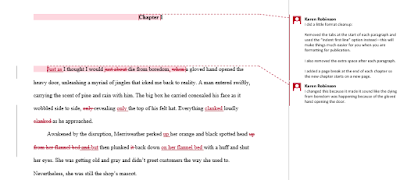The words poured effortlessly from my fingertips and onto
the page completely free of grammatical errors and typos, forming a perfect,
succinct, and intriguing story that everyone in the world wanted to read…said
no author ever. Rewriting and editing comes with the job and there’s absolutely
no way around it, but luckily there are ways to make it less painful.
Since finishing The Nightmare Birds, I’ve already re-read
the entire thing a half dozen times on my laptop, then another two times
printed out, then passed it off to a few beta readers, re-read it again, and then sent it off to my
editors for a final polish. When I get it back, I'll have more
editing, more rewriting. Then, there will be another reading or two printed out and
then a final arc read through. It takes forever and is incredibly tedious, but
it’s well worth it, especially if you compare what you originally wrote to the
final thing. Just take a look at this massacred page from one of my Strange Luck edits.
My first drafts are terrible. They’re slow and peppered with lots
of unnecessary scenes and words. I also have a tendency to think a particular word,
but type a similar sounding word with a completely different meaning instead. It's super fun going back and finding those (*eye roll). The worst is when you think you’ve finally tamed the beast,
but you open the Word doc to find it covered in red.
If there’s one piece of solid gold advice I’ve learned from
rewriting and editing over the years it’s this: TAKE BREAKS FROM YOUR STORY. As soon as it
starts to feel like “work,” becomes boring, you stop looking forward to working on it, things stop making sense, and/or
you begin losing track of important details (dates, ages, hair color, etc.),
then it’s time to put the manuscript down and walk away. I know it may seem counter-intuitive because you’re in “the zone,” but trust me, you’ll end up
doing more harm than good. I’ve had to force myself to walk away from The
Nightmare Birds probably a dozen times to recollect myself. Sometimes it was
for a few days, other times a few weeks. This has meant pushing back my launch date, which has really sucked, but I'd rather have a well-written book that comes out a little later than a garbled, incoherent story.
Even if you're not experiencing any of the symptoms above, YOU STILL NEED TO TAKE BREAKS from your work. Only you will know when and for how long. Just make sure it's at least a few times.
 |
| This is totally me. :P |
Why get up and walk away? Because you'll be able to
look at your story with fresh eyes. Taking a break also rekindles the passion for your story and characters. It took me a long time to implement this practice, even
after I had read Neil Gaiman’s quote when I first started writing seriously:
“The best advice I can give on this is, once it's done, to put it away until you can read it with new eyes. Finish the short story, print it out, then put it in a drawer and write other things. When you're ready, pick it up and read it, as if you've never read it before. If there are things you aren't satisfied with as a reader, go in and fix them as a writer: that's revision.”Walking away is one of the most critical things you can do as a writer, but it's not to say that you shouldn't write at all, just go write something else. Anything else. Your characters will still be there when you return. Your lumpy desk chair will still be there when you return. Your keyboard peppered with food crumbs will still there. I promise. The point is that you need to clear your head so that when you return you'll be at your absolute best.
How do you handle edits? How painful is rewriting for you? Share your tips, tricks, and advice below.
Have you subscribed yet??? It seriously makes my day when I get a new subscriber. :)




No comments:
Post a Comment